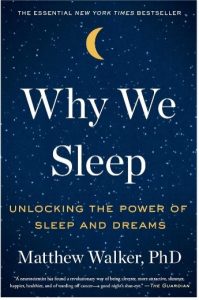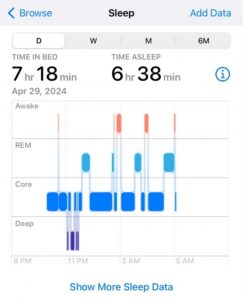
Until very recently, science has been unable to explain why we spend over one-third of our lives sleeping. Dr. Matthew Walker tackles that topic in his 2017 bestseller, Why We Sleep: Unlocking the Power of Sleep and Dreams. Walker is a Professor of Neuroscience and Psychology at the University of California, Berkeley, and Founder and Director of the Center for Human Sleep Science and has recently shared his updated research as a podcast guest. Sleep is a key factor in our health, wellness, and longevity – this post will focus on how to improve sleep by optimizing quantity, quality, regularity, and timing – the QQRT factors.
Sleep Quantity
The first QQRT measure of a good night’s sleep is quantity. Unfortunately, this is the only measure most of us use to rate our night in bed.
The optimal quantity of sleep for an average adult (check other ages here) is between 7 and 9 hours per night. There is a two-hour variance in this optimal quantity based on factors such as age, personal habits and routines, and the three other factors below.
Walker notes that the average person doesn’t get enough sleep, and thus needs “90 minutes more sleep per night!”
Sleep Quality
The second key to optimizing your sleep is the quality of your sleep. Dr. Walker breaks quality into two secondary factors:
- Continuity: was your sleep continuous or fragmented? Waking up multiple times during the night is going to lower your quality.
Sleep trackers measure the efficiency of your sleep by dividing your total time asleep by your total time in bed. In other words, if you go to bed at 10 PM and get up at 6 AM you are in bed for 8 hours. If you took time to fall asleep plus woke up a few times during the night so that your total time asleep was 6 hours, you would have a 75% efficiency score and ideally, would need to improve your sleep quality.

An efficiency score of 85% and above is considered higher efficiency.
- Deep sleep: we go through normal cycles of light sleep, deep sleep, and REM sleep each night. The power of your deep sleep is another important factor in brain recovery and the quality of your sleep. Unfortunately, this is hard to measure without using electrodes in a lab.
Dr. Walker has recently realized that sleep quality is as, or more, important than sleep quantity. He and other scientists have found two other factors that are also very important.
Regularity of Sleep
The third factor to consider in optimizing your sleep is your routine around going to bed and waking. Regularity has recently been recognized as a key factor in optimizing sleep.
Your goal should be to go to bed and wake up within about a 30-minute window. Personally, I try to be in bed by 10:30 PM and wake at 6:00 AM, or just before. I now typically wake up without an alarm after making this my regular sleep schedule for the past several years. I should note that the schedule above works well for my timing – as you will learn about next.
Sleep Timing
The final factor in the QQRT keys to sleep is timing. Not the length of time (quantity) or regularity of time asleep, but how your sleep schedule aligns with your chronotype.
Dr. Walker explains that we all are one of five chronotypes:
- Extreme morning type (often wake at 5 AM, or earlier, but go to bed around 8-9 PM)
- Morning type (bed around 10 PM, wake around 7 AM)
- Neutral (often sleep from 11 PM to 8 AM)
- Evening type (bed around midnight, wake around 9 AM)
- Extreme evening type (ready for bed around 2-3 AM, wake late in the morning)
You can take a short test to learn about your chronotype at this link. Understanding the scientific secrets of perfect timing and aligning your sleep to this optimal rhythm is the final factor.

Summary
We hope everyone interested in Personal Kaizen will improve their sleep by optimizing the quantity, quality, regularity, and timing of their sleep. Our next post will provide additional tips for optimizing sleep, including how caffeine, alcohol, and other substances affect our sleep. We will also offer some counterintuitive suggestions for improving your sleep from Dr. Walker.




